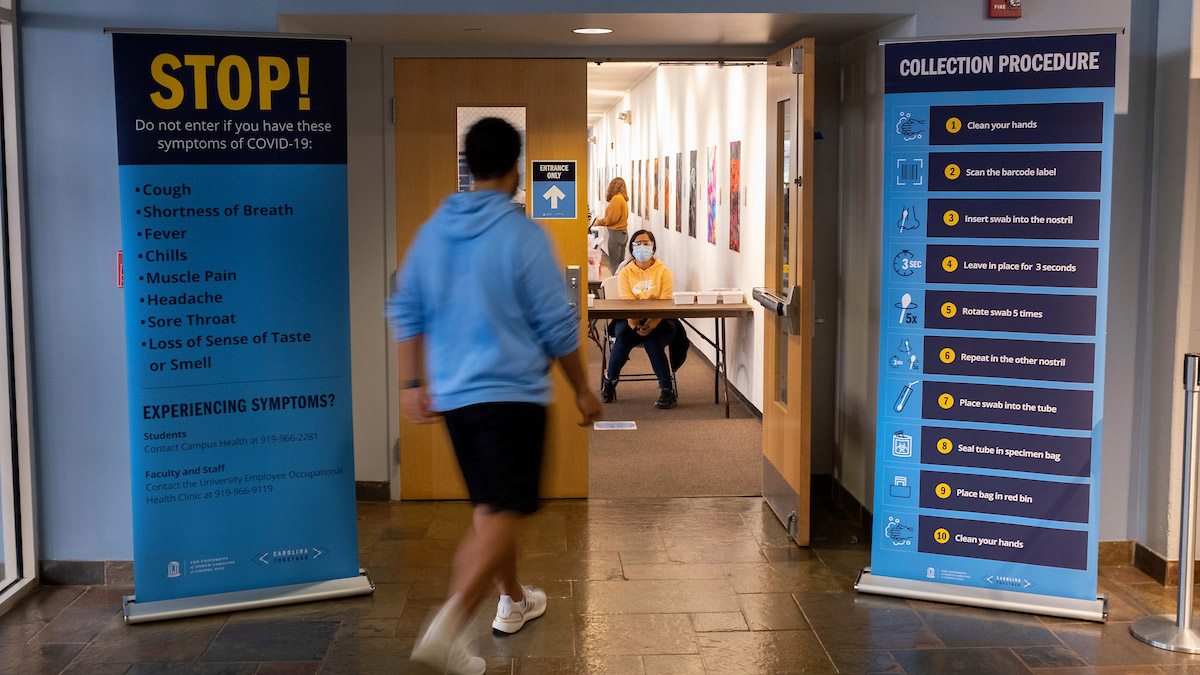Testing post-vaccination life
A clinical trial at the University of North Carolina at Chapel Hill will test whether vaccinated people can spread coronavirus.

New COVID-19 vaccines have been proven to keep people from getting sick. But no one knows yet whether they will keep vaccinated people from spreading the coronavirus to others.
That information may come from a new study launched by the COVID-19 Prevention Network (CoVPN) that will offer the Moderna vaccine to more than 12,000 students across the country willing to do daily nose swabs over the course of the four–month clinical trial. The University of North Carolina at Chapel Hill announced today it hopes to enroll 600 students.
Called the Prevent COVID U study, it is sponsored by the National Institute of Allergy and Infectious Diseases. NIAID Director Anthony S. Fauci introduced the study during a recent White House COVID-19 response press briefing.
“We already know that vaccination can prevent serious COVID-19 disease, but we do not know if the vaccine will prevent virus from shedding from the nose and mouth and infecting others,” said Audrey Pettifor, professor of epidemiology at the UNC Gillings School of Global Public Health and co-principal investigator of Prevent COVID U. “That is what we are testing in this study.”
“The study results will help us understand whether we need to wear masks post-vaccination and help guide our return to daily life,” she said.
If vaccinated people can harbor enough virus in their nose to infect others, they could keep it circulating in their communities.
Early in the pandemic, Pettifor, an HIV/AIDS researcher, began applying her experience in HIV prevention to identifying ways to control the coronavirus. Her new focus now includes serving as a leader of the national COVID-19 study.
Principal investigators in charge of getting the study up and running at UNC-Chapel Hill are Sylvia Becker-Dreps, a family medicine physician and associate professor of epidemiology at Gillings School of Global Public Health, and Nadja Vielot, an epidemiologist and assistant professor of family medicine at the UNC School of Medicine.
The study builds on the results of the COVID-19 vaccine clinical trials and tests whether a person can become infected after they’ve been vaccinated and if the vaccine will stop person-to-person transmission.The answers will support science-based decisions on mask use and social distancing post-vaccination.
“Our hope is that we demonstrate that COVID-19 vaccines prevent people from getting infected with coronavirus in the first place and that it stops transmission to others,” said Larry Corey, principal investigator of CoVPN’s operations program and professor at the Fred Hutchinson Cancer Research Center, where the network is headquartered.
Prevent COVID U opened initial study sites March 25, andstudy results are expected to be ready before the fall semester begins.
UNC-Chapel Hill students, ages 18-26 years old, are eligible to participate in the study if they have not had COVID-19 and plan to be around the Chapel Hill-Carrboro area this summer.
Half of the students will be randomly selected to receive the vaccine right away at enrollment, while the other half will get the vaccine four months later. All participants will know at enrollment which treatment group they are in, and all will ultimately receive the vaccine.
Throughout the study, participants will complete questionnaires through an electronic diary app, swab their noses daily for COVID-19 infection and provide blood samples periodically. They will also be asked to get tested twice a week at the Carolina Together Testing Centers. Participants will be paid for the daily nose swab collection.
Ideal population
College students are an ideal population to participate because large numbers of COVID-19 cases have been reported on college campuses. A nationwide survey found that more than 535,000 infections have been counted at universities in the U.S. since the pandemic began.
While there are many populations who have a high risk of COVID-19 infection, young people are particularly at risk for getting and spreading the virus. High-density housing, the impulse to socialize and less fear of severe disease contribute to the high burden of COVID-19 on college campuses, said study designers.
About 25,500 individuals identified by participants as close contacts, for example, roommates, will also be invited to take part in the trial to help study investigators measure the spread of the virus.
“By participating in this study, UNC-Chapel Hill and its students are contributing to history and should be congratulated for the role they will play in moving us through this pandemic,” said Pettifor.
To learn more about the clinical trial, go to Prevent COVID U or email preventcovidunc@unc.edu




